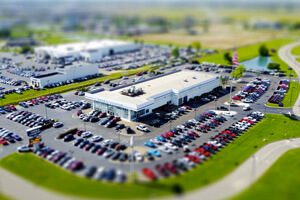

According to IoT Analytics, the leading IoT Market Research Firm, the global on-street, and off-street public parking spaces have gone smart by 11%. The statistics are anticipated to climb to 16% by 2023. Moreover, the research estimates that market investment in smart parking products will rise at a CAGR of 14% and lead to minimum $3.8 billion by 2023.
Smart parking integrates technologies such as detection sensors, smart parking meters, smart payment for parking, cameras with an automated vehicle, license plate recognition, navigation apps for parking guidance, and digital signage. Apart from providing an end-to-end solution to users, a complete smart parking system enables parking operators to monitor parking occupancy rates in real time – remotely and automatically.
More importantly, the real value of incorporating tech factor into the parking system lies in the parking data generated. And when this data is combined with data from delivery firms, agencies, and vendors, the processes and systems can lead to real innovation in smart cities, as per IoT Analytics.
The initiatives and a case study discussed further reveal the different aspects of bringing in smart parking technology in the urban agglomerations.
Amsterdam Increases Parking Occupancy Rates To Discourage Cars
IoT Analytics suggests that driver patterns and behaviour related data can aid urban planners in optimising traffic flow and reducing congestion. Adapting to parking fees in order to encourage or discourage drivers away or into a particular area at rush hours is another strategy that helps.
Amsterdam is embracing an almost similar kind of strategy to discourage use of cars in the city. The municipality of Amsterdam is raising the parking fees for car parking in the city centre. Parking fees have been raised from 5 euros per hour to 7.5 euros per hour. The fees will be effective in the city centre from April 2019.
Amsterdam introduced smart parking technologies a few years ago. The city has apps to locate parking spaces, and sensors to detect overstay of vehicles. Besides, most of the cars have digitised license plates. The Dutch city stands at the 182nd position on the global traffic congestion rankings, yet it is working on reducing car dependence in the city – to improve quality of life.
The municipality aims at making the city more livable and accessible by creating more space for cyclists, pedestrians and green areas. The extra parking fees collected from the residents will be utilised in improving the quality of public space infrastructure while investing in smart mobility.
Furthermore, the city government hopes that the rise in parking fees will encourage residents to opt for public transport. In addition, the city is already investing 400 million euros in launching new trams, subways, and electric buses.
The high car parking fee is not the only strategy being introduced to discourage cars. The government is removing some parking spots and prioritizing public transit. Additionally, it is also experimenting with smart mobility solutions by using technology to optimise traffic flow.
Although parking fees hike to reduce jams is a controversial solution, research reveals that surcharging drivers during rush hours reduces the number of cars on the road. Even a 10% decrease in the cars could lead to a 20-50% reduction in congestion.
In fact, similar fee systems have been successfully implemented in smart cities like London and Stockholm.
The One-of-its-kind Smart Parking Town In UK


AppyParking, kerbside management, and smart parking technology firm, provided the integrated solution. It installed over 2000 surface-mounted Bluetooth sensors in more than 900 public parking spots in the town centre.
The firm installed the innovative application with integrated technical capabilities including smart parking sensors, sensor-enabled payment system, and automatic number plate recognition (ANPR) barriers extending a smooth experience to the thousands of users. The application is on for both off-street as well as on-street parking while being a kerbside utilisation tool for local authorities.
In addition, AppyParking integrated One Click Parking (in the app) in collaboration with the payments technology company Visa. With the help of sensors, the service enables the app users to initiate a payment for parking automatically until they drive away. Users will be charged on per-minute rate which will allow them to pay only for the time the vehicle is parked.
It will also assist users in finding out nearest parking spots thereby reducing time and fuel squandered in looking for parking.
Most importantly, the council of Harrogate will have access to an analytics dashboard that shows the parking utilisation data. With the ability to view parking heatmaps and demand flows, local government will be able to get a better insight into how their parking assets are being used.
The primary objective to provide this integrated system is to give a better insight into parking infrastructure, inform traffic planning, help spur the high street and gear up cities for a future of automated and connected vehicles.
New Plymouth – Case Study
New Plymouth, a city on the west coast of New Zealand’s North Island is the leading centre for agriculture and energy extraction. As a part of its commitment to developing a parking strategy that could ensure fair access to space occupancy, the Council looked to transform the effectiveness of on-street parking and also to make important upgrades to its off-street parking facilities.
Hence, Smart Parking, the leading parking technology firm provided the solution to this challenge. The company installed 1,500 in-ground vehicle detection sensors across a 15-kilometre roadway in the city centre. Each sensor was linked in real-time to the city’s multi-bay on-street parking machines. The sensors keep track on when a specific parking spot is occupied or vacant.
When a parking spot is occupied, the payment made by the driver along with the occupancy status is communicated in real-time to Smart Parking’s software called SmartRep. This is then translated onto the meter provider’s database. Moving further, the enforcement warden’s handheld system receives the updates which help in issuing penalties in case any infringement occurs.
In the case of off-street parking at a major retail location, The Warehouse, the company placed compelling signage. This helps relay information from the sensors and SmartRep to the variable message signs. With big, clear and digital-display screens the customers are now able to see how many parking spaces are available in the car park. Additionally, it also assists people to navigate their way to the location.
The new parking strategy deployed by Smart Parking company has transformed the New Plymouth’s capability to address on-street overstays. Wardens are now able to target the contravening vehicles directly rather than examining all vehicle expiries randomly. Furthermore, integration of SmartRep has significantly enhanced the accuracy of the information on space occupancy. With this, New Plymouth can accomplish a balance between penalty charge revenue and staff costs while generating a fair turnover of space occupancy. Simultaneously, the new parking experience at The Warehouse has increasingly reduced congestion and emissions.


































